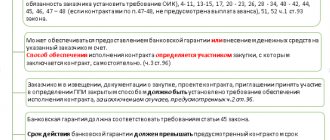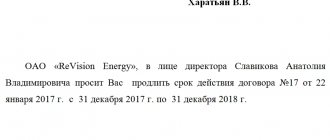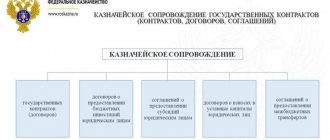The general rule is that security in a contract system comes in two forms, the first being money and the second being bank guarantees. But the choice always remains with the supplier. He can either transfer funds to pay for the security deposit or provide a bank guarantee.
In some situations, security for contracts is not established due to their specific nature. These include cases when the supplier is a government institution, the procurement object is providing a loan, and the contract is concluded by unitary enterprises for the issuance of a bank guarantee.
Security under contracts, as a rule, is not established on requests for quotations, although the customer has such a right.
Privileges for small businesses
It is worth noting that special conditions are now in place for small businesses (SMBs).
So, for example, security is not needed if the purchase was carried out specifically from SMP and the winner provided information about his good faith (Part 8.1 of Article 96 of Law No. 44-FZ), proving that over the past three years he has fulfilled government contracts and municipal contracts without penalties on similar topics and under similar financial conditions.
There are also special conditions for calculating the amount of security for small businesses. In procurements with advantages for SMP and SONCO, the customer sets the amount of security based on the contract price formed at the auction, and not on the initial maximum contract price.
An example of calculating the amount of security under special conditions
Auction RUB 1,750,000 with contract security of 10%, that is, 175,000 rubles. The winner reduces the price to 1,200,000 rubles; accordingly, the security for the contract will not be 175,000 rubles, but 120,000 rubles. (10% of the winner's price).
Changes in procurement for SMEs and socially oriented non-profit organizations
Participants in public procurement who have experience in successfully executing an order have the right not to secure a contract
This means that the winner of the purchase may not provide cash or bank guarantees. This is only allowed to bona fide suppliers.
Registration in the ERUZ UIS
From January 1 2020 , in order to participate in bidding under 44-FZ, 223-FZ and 615-PP, registration in the ERUZ register (Unified Register of Procurement Participants) on the EIS (Unified Information System) portal in the field of procurement zakupki.gov is .ru.We provide a service for registration in the ERUZ in the EIS:
Order registration in the EIS
That is, if the participant is a successful executor of government contracts:
- completed at least three contracts without fines or penalties;
- the fact of execution is recorded in the register of government contracts and is confirmed by an extract from the register;
- the amount of completed contracts is not less than the initial maximum price of the current purchase.
The amount of contract security will be calculated from the price of the winner of the government contract, and not from the IMC (initial maximum price)
In government procurement with advantages for SMP and SONKO, the customer will set the amount of security based on the final price of the government contract, and not the NMC.
Let's give an example.
The customer holds an auction among small businesses for the purchase of special cleaning equipment. The initial maximum contract price is 5 million rubles, contract security is set at 3%.
The winner of the purchase reduced the price to 3 million rubles.
According to the old rules, contract security would be 150,000 rubles.
According to the new rules, contract security will amount to 3% of its final value, that is, not 150,000 rubles, but 90,000 rubles.
The same requirement for purchases with a 25% reduction when anti-dumping measures begin to work.
But one way or another, the security should not exceed the amount of the advance.
IMPORTANT! Most likely, both benefits will apply to purchases only among small businesses. If such an entity begins to participate in the general auction, benefits will not apply to it.
Warranty rules have changed
According to 44-FZ, the customer has the right to insist that he be provided with a warranty period for goods and work (Part 4, Article 33 of 44-FZ).
What changes have appeared:
- In the new edition, 1 part 96 art. 44-FZ also introduced a condition on mandatory warranty obligations in closed procurement (previously, only the execution of the contract was mandatory in closed procurement).
- Small businesses will pay no more than 10% of the initial maximum contract price for guarantees.
What you need to pay attention to:
- If a bank guarantee is presented as collateral, you must remember that its validity period must be longer than the guarantee period (at least a month).
- If the purchase included a requirement to provide security for warranty obligations, and the contractor did not provide it, the customer will not sign acts of acceptance of the goods or work.
Allowed to change the “dimensions” of collateral
Previously, it was also possible to change the types and amounts of collateral, but in the new edition of Article 96, clarifications have been added.
The amount of security can be reduced if the contract provides for separate stages of its execution.
The security can be reduced only in proportion to the fulfilled obligations.
For example:
- One of the stages of the government contract was completed without penalties and received payment for it. When the report on the completion of the stage was entered into the register of contracts, the contractor asked the customer to return the deposit in an amount proportional to the cost of the completed stage. If there was an advance payment in the purchase, the cost of the work performed should be higher than it.
- The bank from which the contractor received the bank guarantee was deprived of its license and is providing a new guarantee.
- The method of collateral execution of government contracts has changed. For example, it is more convenient for the executor to take the deposit in money in exchange for a guarantee.
In procurement for the country's defense and security, procurement of medicines and legal services, provision cannot be reduced.
Changing the provisioning method
The method of enforcing the contract may be changed. This is useful if the winner of the purchase does not have time to issue a bank guarantee, provides security in cash and later exchanges the ready guarantee for the amount of the security.
The security may be reduced in proportion to the fulfilled obligations (you must have confirmation of such fulfillment, and such a supplier should not have any penalties or complaints).
For small businesses, the security is returned within 15 days from the date of fulfillment of obligations, for others - within 30 days from the date of fulfillment of obligations.
If during the execution of the contract the bank that provided the bank guarantee to the supplier has its license revoked, the supplier is obliged to provide a new bank guarantee or provide cash security.
Amount of contract performance security under 44-FZ
When conducting a purchase through an electronic auction, 44-FZ imposes on the customer the obligation to require the supplier to provide security for the execution of the contract. The procedure for its submission and the permissible size are determined by Article 96 44-FZ. Without collateral, it will be impossible to conclude an agreement.
What is contract security?
Contract security is usually called the collateral provided by the supplier to the customer. It acts as a kind of insurance that the party will fully cope with its obligations under the contract. In the event of material damage to the customer, he will have the opportunity to cover the losses using security funds.
Information about the need to provide contract security and its amount is specified in the notice, procurement documentation and draft contract. This procedure is established by Part 1 of Article 96 of 44-FZ.
The conclusion of a contract is possible only after the supplier provides security. Otherwise, the winner of the procedure is recognized as having evaded signing the contract. The customer is obliged to transfer information about it to the register of unscrupulous suppliers.
Methods of providing security
The legislator has provided two main forms of providing security for the execution of a contract:
- Transfer of funds to the customer's bank account. The fact of provision of security is confirmed by a payment order. It is transferred by the supplier to the customer along with the contract signed on its part.
- Bank guarantee. The supplier can enter into an agreement with a large bank, which issues a document that acts as a collateral for its obligations.
If the amount of contract security is large, suppliers are recommended to resort to a bank guarantee. This method allows you not to take a large amount out of the company’s turnover.
When provision is required
The customer is obliged to establish requirements for the provision of security for the contract concluded after the implementation of the electronic auction for all procurements. There are only a few exceptions to this rule:
- If the supplier has the status of a government institution, he is exempt from the obligation to provide security.
- When purchasing goods and services necessary to meet the country's defense needs.
- The security is also canceled when purchasing from a single supplier in the cases provided for in Article 93 44-FZ.
- Purchase of services for providing a credit limit.
- Concluding a contract for the provision of a bank guarantee.
In all other cases, provision of security is mandatory. The supplier has the right to choose the method in which he will transfer the collateral.
Calculation of the security amount
The amount of security for the execution of the contract is determined based on the NMCC. According to Part 6 of Article 96 of 44-FZ, it cannot exceed 30% of the starting price. You can determine the range of the collateral volume using the table.
| Starting price of the contract | Collateral amount |
| Up to 50 million rubles | from 5% to 30% of NMCC. In this case, the amount of security cannot be less than the advance payment transferred by the customer. |
| Over 50 million rubles | from 10% to 30% of the NMCC, but not less than the amount of the advance provided. |
Within the ranges described above, the customer has the opportunity to independently determine the amount of security.
Here's an example:
The starting cost of the contract was 60 million rubles. The customer provided for an advance payment of 5 million rubles. It turns out that the amount of security can be set in the range from 6 to 18 million rubles.
Increasing the amount of contract security
If, as a result of an electronic auction, the final price of the contract fell by more than 25%, then the amount of security increases by one and a half times. Such measures are anti-dumping in nature. They are established by Article 37 44-FZ.
If the initial contract amount does not exceed 15 million rubles, the supplier has the opportunity not to increase the amount of security. To do this, he must prove his integrity. To do this, it is enough to provide an extract from the register of contracts. It must contain at least three contracts that the supplier performed without violations. If there are significantly more than three contracts, then 75% or more of them must be executed without claims from customers. It is worth considering that the total amount of all contracts must exceed 20% of the value of the contract that is planned to be concluded.
Contract security is a guarantee that the supplier will fulfill its obligations in good faith. The supplier must carefully review all requirements prior to submitting an application. If the requirements are not met, it may be included in the RNP.
4.0576923076923 Rating 4.06 (26 Votes)
Ensuring warranty obligations
Warranty security is finally separated from contract security. The customer has the right to demand such security from the supplier.
The appearance of such a norm should not have come as a surprise - it had been talked about for a long time that this would happen. For now, it is mandatory only for closed purchases; as for all other purchases, it all depends on the will and desire of the customer.
Often customers are faced with a problem when the contract is completed on time, the procurement item is delivered, but then it is not serviced. Since there is no way to contact the supplier, it is impossible to repair the purchased item if it fails. Now the supplier additionally ensures the fulfillment of warranty obligations if this is provided for in the contract (Resolution of the Government of the Russian Federation dated July 18, 2019 No. 920).
The same security methods are used as for contracts: an amount of money and a bank guarantee.
The supplier may take out two separate bank guarantees: one to secure the contract, the other to secure the warranty obligations.
If the payment is made in money, if the contract is fulfilled and the warranty work is not performed, the supplier may demand the return of that part of the security that falls on the contract. The part that covers the fulfillment of warranty obligations will remain with the customer until the expiration of the warranty period.
New rules and clarifications on advance payments
On July 1, 2020, 124-FZ dated April 24, 2020 amending 44-FZ came into force.
The new rules for working with advances are that in case of treasury support of an advance, the amount of contract security is calculated from the NMCC, reduced by the amount of the advance, and for purchases with restrictions for small businesses under clause 1, part 1, art. 30 44-FZ from the contract price reduced by the amount of the advance. It was allowed to change the essential terms of the contract regarding advances under 44 Federal Laws in 2021. The Ministry of Finance in Letter No. 09-04-05/41434 dated 05/19/2020 listed the conditions, subject to the simultaneous observance of which this is possible:
- the new advance does not exceed the maximum amount established by law for the contract. For example, an advance payment under a contract for the construction of regional and municipal facilities (if subsidies from the federal budget are allocated to the region to finance them) is no more than 50% of its amount;
- advance payment is specified in the government contract;
- the change is made by agreement of the parties at the initiative of the supplier;
- Circumstances that prevented the contract from being fulfilled on the terms it envisaged arose due to the coronavirus.
Special conditions for a bank guarantee for warranty obligations
The guarantee must stipulate the customer’s right to demand that the bank pay the amount under the guarantee in case of violation of the guarantee obligations.
But the bank does not have the opportunity to carefully check what was violated and under what conditions. If a guarantee is presented for payment, the bank must pay it off as quickly as possible.
The list of documents that the customer provides to the bank along with the guarantee is approved and registered. The rules for maintaining the register of bank guarantees have been changed, since the guarantee for the guarantee obligation is placed there as soon as possible. The warranty period itself usually exceeds the warranty period by at least a month.
The bank must place the guarantee in the register of bank guarantees the very next day after its issuance.
Advantages and disadvantages of advances under 44-FZ
Using an advance payment under 44-FZ in 2021 for budgetary institutions has both pros and cons, which are important for the customer to know about when holding a tender.
Prepayment makes it easier for the contractor to pre-order GWS - he spends the funds received on the purchase of consumables, can choose the most suitable subcontractor, and not rely only on his financial capabilities.
True, the approach we are interested in increases the likelihood of losing the contract; more precisely, it all depends on the size of the advance under 44-FZ. After all, the contractor, having received 100% advance payment, may refuse to fulfill the terms of the contract. Let us make a reservation that for such actions the law provides for the imposition of penalties, fines, and the entry of information into the RNP.
The amount of security increases if the price decreases
Anti-dumping measures should be taken into account separately. Their purpose is to control excessive price reductions during procurement. If during the bidding process a participant reduces the price by 25% or more, then he must back up his actions with security increased by 1.5 times.
With an initial (maximum) purchase price of 15.0 million rubles. or less, the participant, instead of increased security, has the right to provide information that within one year before the date on which the application was submitted, he fulfilled at least three contracts without violations (or at least four contracts within two years). Note that at least 75% of such contracts must be executed without the use of penalties. In addition, information may be provided that within three years prior to the date on which the application was submitted, three or more contracts were successfully performed by the supplier, and each of them was performed without the payment of penalties. In such cases, the price of one contract already executed by a participant must be no less than 20% of the price of the government contract for which this participant is applying.
Bidding information: how to search?
Many experienced suppliers use a special web service “Kontur.Purchases” to search and structure information. It will help the supplier quickly find the necessary purchases. The service has a “smart” search that allows you to search for purchases by industry, type of tender, region, customer or price, and can also correct typos without attaching importance to the endings of words. The web service, based on information about previous government procurements, is able to analyze customer requirements, as well as make a forecast of competitors’ behavior strategies. However, the main thing in the “Kontur.Purchases” service is the supplier’s ability to customize request templates for trading procedures for “their” goods and receive email notifications about the appearance of tenders, competitions or auctions of interest in the system.
Tags : electronic procurement, 44-FZ, securing applications, contract security, bank guarantees,
October 25, 2016
Number of views: 9261
Please rate how useful this material was.
Rating: 5/5 — 2 votes
Similar articles:
- Regulations have been approved for checking supplied goods using both video and photographic equipment for compliance with information under the contract (275)
- Court: in the public procurement notice you can indicate information in the form of a reference to documentation (227)
- The Russian Armed Forces figured out from what date to count the limitation period when changing the price of a government contract (226)
Comments ()
Securing the application
When submitting an application to participate in an electronic auction or competition, each participant is required to make a security payment, and it is the responsibility of each customer to establish the amount of such payment. As for the amount of security, it is set by the customer, and the range is 0.5-5% of the initial (maximum) contract price. For example, if a customer needs to purchase cartridges for office equipment in the amount of 600.0 thousand rubles, then the amount required to secure the application, as well as participation in the electronic auction, will be 30.0 thousand rubles, or 5.0%.
The requirement to secure applications applies to all participants without exception. Its purpose is to compensate for the losses of municipal and state customers in the event that a participant submits an application, wins the tender, but avoids concluding a government contract. In such a case, the security for the application remains as compensation with the customer.








